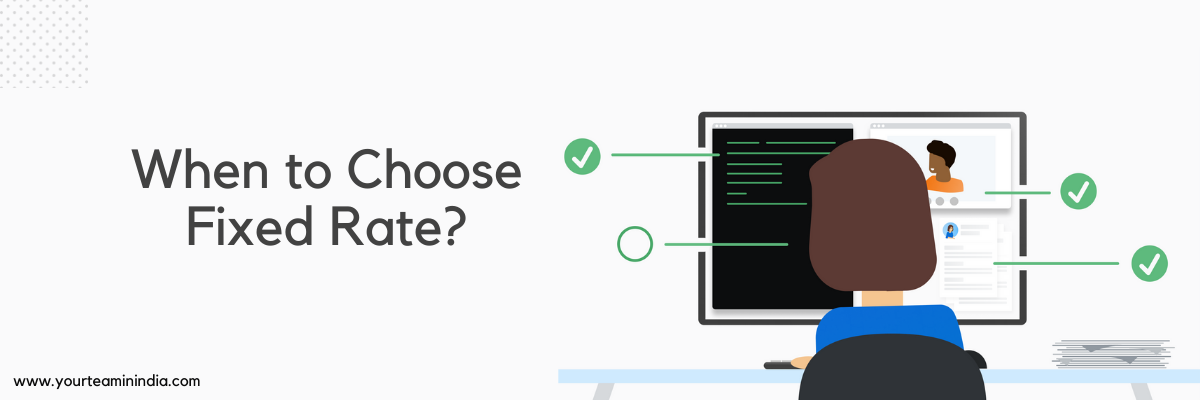
Yay, I finally got an excellent development team, but should I hire them on an hourly rate or a fixed rate?
That’s where every entrepreneur gets stuck - especially if it’s his first time hiring the team.
Hourly rate vs. Fixed-rate - which is better - is the very ‘Great Pricing Debate’ that every entrepreneur goes through at least once during his business.
(This topic usually creates so much stir during planning for app/web development. However, we are going to solve it once and for all today).
As an entrepreneur, you must know the difference - as that’s going to impact your overall planning and cost. Also, implementing the right pricing model is a must for any business (just telling, no pressure there).
The difference between a flat rate pay and an hourly rate pay is how you bill the client. For flat rate pay, you're paid a set price for the job done. In contrast, hourly rate pay is based on the amount of time you work which means you're paid a set amount for each hour of work.
It is critical to understand the meaning, pros, and cons of both hourly rate and fixed cost (as that will impact your overall project).
This article will cover everything. Let's begin:
What is a Fixed Cost?
The name says about how the payments are in this one - fixed. It won’t fluctuate, rather stay fixed based on the project or certain task.
The experience is quite different for both you and the team you have chosen when you are paying them for the complete work and not for being on the clock.
Once the project starts, the precise estimation of hours needed, the scope of work, and deliveries come into play.
| We asked one of our developers whether he liked hourly rate jobs or fixed ones. And, he immediately said fixed. Okay, maybe it was his perspective, but his explanation for his answer was pretty justifying his statement. He said, “I will prefer Rs. 35000 development tasks done in 3 hours since that is the more respectable rate for me. However, the hourly rate never paid me so much - especially when I was new in the business and barely had any strong references.” |
That was a subjective statement, though.
Note: That was just the perspective of one developer, and the other could have a different opinion about the same situation. However, a business owner must know how do the developers think.
Pros of Fixed Cost Hiring

- Less Hassle for both you and the developers. There is barely any need to track the hours or keep an eye on their progress during those hours. Just regular communication or daily reports are usually enough.
- Clear objectives defined since you will be explaining your project to the team clearly and thoroughly once. Of course, queries and concerns will occur during the process too, but to a certain extent.
- No hassle of frequent payments, as it will be done once a month. That will rest your mind, and even your developers will feel the peace working with you, as both know it will be paid and received on the said date.
Cons of Fixed Cost Hiring
- Inflexible since a project usually demands modification at different stages of development. But being fixed price, you will need to re-analyze everything - time, cost, schedule, priorities, and so on. Hence, a time-consuming process there.
- Lethargic employees may feel they have enough time to complete the tasks assigned, which could hamper productivity. Hence, less quality control comparatively.
When to Choose Fixed Cost?

Choose fixed rate jobs for standard jobs where the duration and tasks are you certain of already. Projects with a well-defined scope with a fixed beginning and end are perfect for a fixed rate. Small projects suit this rate type best compared to bigger ones.
Also, it is a good deal for developers since they also have everything defined in advance, such as the tasks, deadline, and even the price - creating no hassle when working on it.
Mostly, entrepreneurs go for fixed rates with a new development team - however, that’s not the case every time. The objective to do so is to bust the risk of them going over your budget.
What is an Hourly Rate?
It is when you are hiring the development team or hiring a developer on an hourly basis. This model lets your team value their time and pushes them to perform accordingly.
The hours might be tracked in this case to see what your team is actually doing at the desk.
With so many tracking apps available today, it is easy to track their hourly performance and see productivity accelerating each minute.
| We asked another developer the same question whether he prefers an hourly rate job or a fixed one. And, he within a second said, “I prefer the hourly one.” Upon asking why, he said, “I want to stay productive right from the hour I start working every day. My productivity is generally high when I do hourly rate jobs. Also, I don’t need to explain to the client again and again what I did the entire day.” |
That’s another subjective statement, but we got the point, right?
Pros of Hourly Rate Hiring

- Accuracy is something that you can expect when hiring a development team on an hourly basis. If you use an activity tracker, you will clearly see how your team is performing.
- Extra hours don’t become an issue; instead is a sign of being more productive. In hourly, everything stays transparent if you record the activity. And, even if not, you may easily ask them about their progress to understand what they did.
- ‘Payment delayed concerns’ vanishes since you will pay exactly for the number of hours they worked. And, you can always decide on a particular date to pay them based on how many hours they worked.
Also Read: Software Developer Hourly Rates - Comparison Across the Globe
Cons of Hourly Rate Hiring
- Efficiency might be impacted since the pressure is to complete the jobs within specified hours anyhow. And, in a rush to complete the work, the chances of mistakes go higher.
- Tough to predict cash flows since it is hourly. You can’t precisely predict both the payments and the profits to be received. Even the extra hours worked might become a concern if that goes beyond your budget.
When to Choose Hourly Rate?

Hourly rate hiring seems goof for projects where you are unfamiliar with the processes involved. Being an entrepreneur, you might not know about all technicalities involved in the development process.
Hence, hourly would be a suitable option to track their progress and even know which process consumes how much time.
It is suitable if you are unaware of the exact hours of work needed to complete the project - even when the level of communication or involvement required is identified.
Or, generally, when you wish to track the progress based on every hour your development team works - to maintain the much-needed transparency in the business.
It is better to stay with the hourly rate hiring for all those unstructured projects where a lot of subjective back and forth is involved.
This Great Pricing Debate Ends Here!
Now you know it all. Being an entrepreneur, you understand their meaning, upsides, and even downsides. You even are acquainted with in what situation both rate types come in handy.
So, which one will you choose for your next app development project?
We understand that this endless price debate might lead to very subjective answers.
However, we at YTII give you access to both types of development teams - the fixed-rate one and the hourly based too.
So, irrespective of your project, business needs, the scope of work, and even the deadlines, we ensure you get different types of development teams.
All we need to know is your business requirements and a little about your project and its objectives. (And, of course, those valuable factors that will make it more personalized).
To speak with your specialized development expert, you need to reach us here
Let’s speak today!







